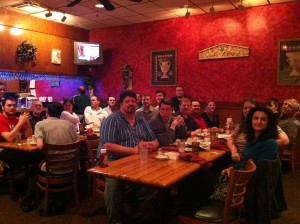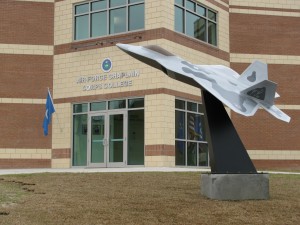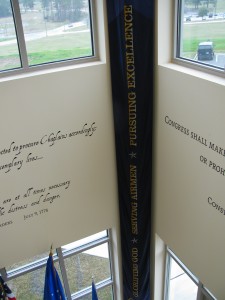Military atheist visits chaplains
 (by MAAF President Jason Torpy)
(by MAAF President Jason Torpy)
From March 16th to 22nd, I traveled to Virginia and North and South Carolina to put out the MAAF message and improve the support of atheists, humanists, and other nontheists in the military. The intention was to visit local civilian organizations, meet MAAF members, and speak with chaplains. Six local humanist groups came out to hear the message, and those audiences included several MAAF members. I was also able to meet with Justin Griffith and members of MASH Ft Bragg. Chaplains at Ft Bragg, Naval Station Norfolk, and the Air Force Chaplains College at Ft Jackson reviewed MAAF resources and listened to some of the issues facing us.
The chaplains hold power and influence within the military and have control over resources. This is precisely because of the important missions chaplains carry out in caring for service members, advising the chain of command, and either providing or providing for religious support (as explained in chaplaincy regulations such as AF Instruction 52-101, Navy TRP 1-05.1, Army Reg 165-1, and Joint Pub 1-05). However, chaplains have few resources to help nontheists, and nontheists often expect hostility from chaplains. Some chaplains have been receptive to improving their support and negative perceptions.
During the trip, Chaplain Major Jeffrey Quinn hosted me at Naval Station Norfolk. He is currently drafting updates to Navy programs including the command religious program, religious accommodation, and lay leader certification. He has explicitly recognized humanists and atheists as a way to improve the diversity of the services of the Navy chaplaincy. There is also a balance of establishment protections as well as opportunities for free exercise. By including MAAF, he took a positive step toward accurately representing the nontheist perspective. There are many steps in the vetting process for new regulations, but I’m excited about the progress and inclusiveness so far.
 On March 16th, I visited the Air Force Chaplain Corps College and was hosted by the Deputy Commandant, Chaplain Colonel Jimmy Browning. We met at the Air Force Academy Religious Respect Conference last November. The Air Force maintains a dedicated schoolhouse on the same campus with the Army and Navy/Marine schoolhouses at Fort Jackson, SC. Chaplain Browning brought in staff, including the senior enlisted advisor and the heads of the two departments within the college – education and resources. The staff provided a briefing and tour of the facility to show what they currently do and how they might help nontheist service members.
On March 16th, I visited the Air Force Chaplain Corps College and was hosted by the Deputy Commandant, Chaplain Colonel Jimmy Browning. We met at the Air Force Academy Religious Respect Conference last November. The Air Force maintains a dedicated schoolhouse on the same campus with the Army and Navy/Marine schoolhouses at Fort Jackson, SC. Chaplain Browning brought in staff, including the senior enlisted advisor and the heads of the two departments within the college – education and resources. The staff provided a briefing and tour of the facility to show what they currently do and how they might help nontheist service members.
 Spiritual and religious terms and imagery were ever-present. A quote from George Washington promoted the importance of religion to the military. A large banner included three core values: Glorifying God, Serving Airman, and Pursuing Excellence. There is a primary mission to “care for the airman’s soul.” All of the chaplains continually returned to their spiritual mission – spiritual in the sense of divine worship and matters of the (supernatural) soul. It cannot be denied that the chaplains are established for, focused on, and most comfortable with their traditional mission to support divine religious views and practices, but that is not the end of the story.
Spiritual and religious terms and imagery were ever-present. A quote from George Washington promoted the importance of religion to the military. A large banner included three core values: Glorifying God, Serving Airman, and Pursuing Excellence. There is a primary mission to “care for the airman’s soul.” All of the chaplains continually returned to their spiritual mission – spiritual in the sense of divine worship and matters of the (supernatural) soul. It cannot be denied that the chaplains are established for, focused on, and most comfortable with their traditional mission to support divine religious views and practices, but that is not the end of the story.
The invitation, the senior personnel present during the meeting, and positive tone of the event were all indications of the openness of chaplains to supporting nontheists. As part of the MAAF Chaplain Outreach program, I presented a briefing showing the perspectives of humanists in the military and some of the culture and activities that make us feel like outsiders. I also presented the humanist philosophy and ethical stance to show how we answer the “big questions.” I asked for some additional detail on the chaplain training program and their resources. The initial meeting was informational to learn about each other as an important foundation for future collaboration on training, programming, and chaplain materials.
I was also able to visit Ft Bragg Chaplain Office about supporting Justin Griffith and MASH Ft Bragg.. In attendance were Fort Bragg Chaplains Hillis, Rozmiarek, and McElroy, as well as several legal and installation personnel. These were some of the same personnel involved evangelical Rock The Fort concert, so it was good to have them speak with us. At least one member of the group seemed reflectively cautious about the prospect of approving an atheist lay leader. But he did participate, and it was helpful to be able to respond to candid questions. I talked with chaplains about the humanist perspective and how they can support us. The chaplains had a lot of questions about what we are looking for in terms of support. We explained that we only seek the same services that religious groups receive, including official acceptance, rooms to meet in, and advertisement of our meetings through chaplain channels.
A major step toward official chaplain support for humanists is to certify a lay leader. Sgt. Griffith has volunteered, with MAAF serving as the endorser. This requires several administrative documents and recommendations to be processed. The chaplains are helping us through our application, and they offered to ask for an interim approval until official approval can be finalized. We are looking forward to approval of the paperwork, advertisement of the first meeting, and the first on-post meeting after the paperwork is processed. Justin is continuing to work towards a Rock Beyond Belief secular event, but Fort Bragg leaders blocked the planned April date. Rock Beyond Belief and other issues notwithstanding, support for MASH Fort Bragg weekly meetings would be a success to celebrate, and the chaplains are helping us to move in that direction.
The initial outcome of a week of visits was a positive reception from three separate chaplain’s offices, several civilian organizations, and a local chapter. The Air Force chaplain school visit, Navy religious accommodation regulations, and Army lay leader support are all hallmarks of a new military inclusive of the humanist perspective. Humanists in Columbia, Raleigh, and northern Virginia heard me explain the vision of MAAF, and heard that we have a long way to go. There is still a long way to go, but at least this week has been positive on all fronts.
